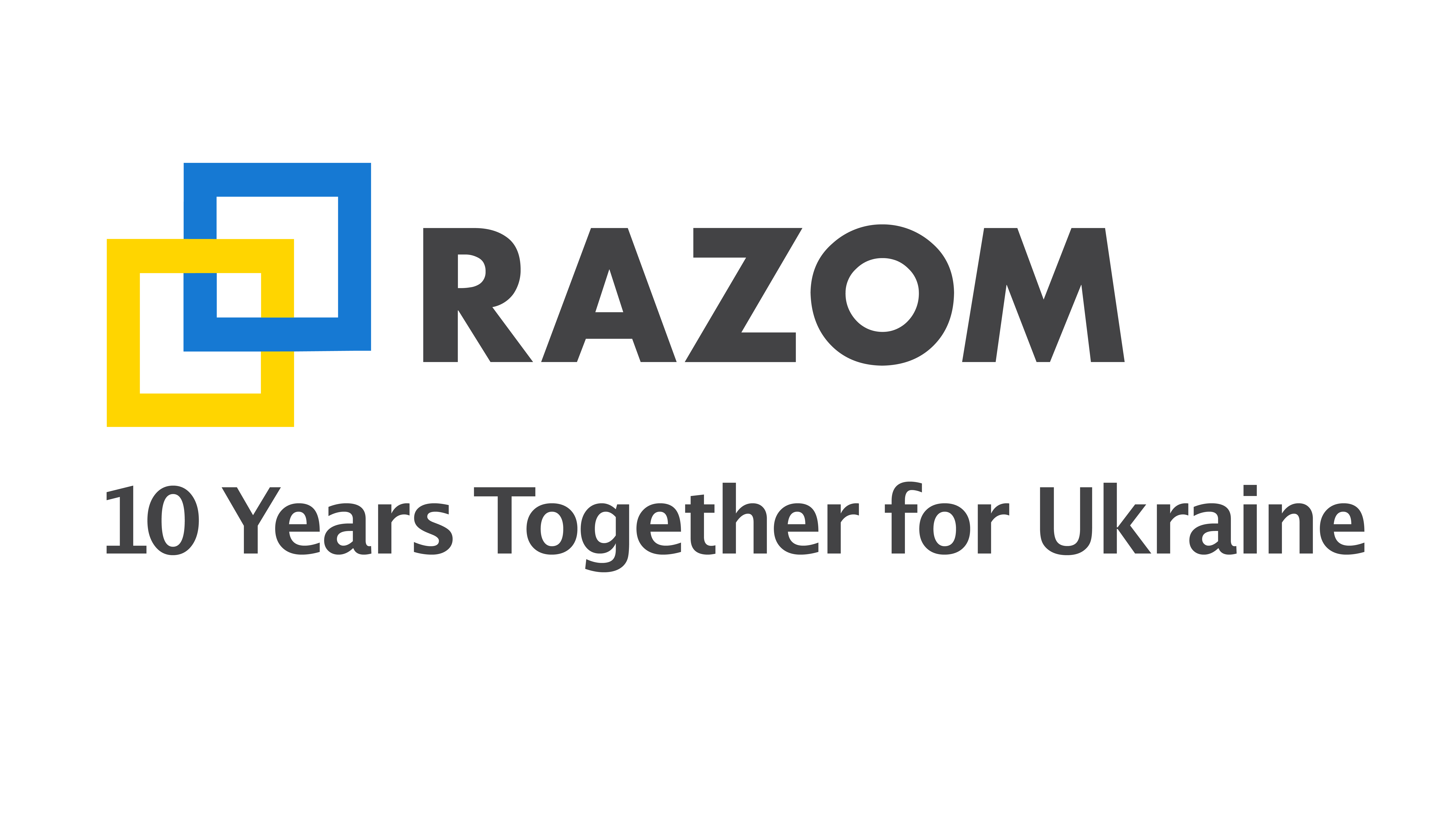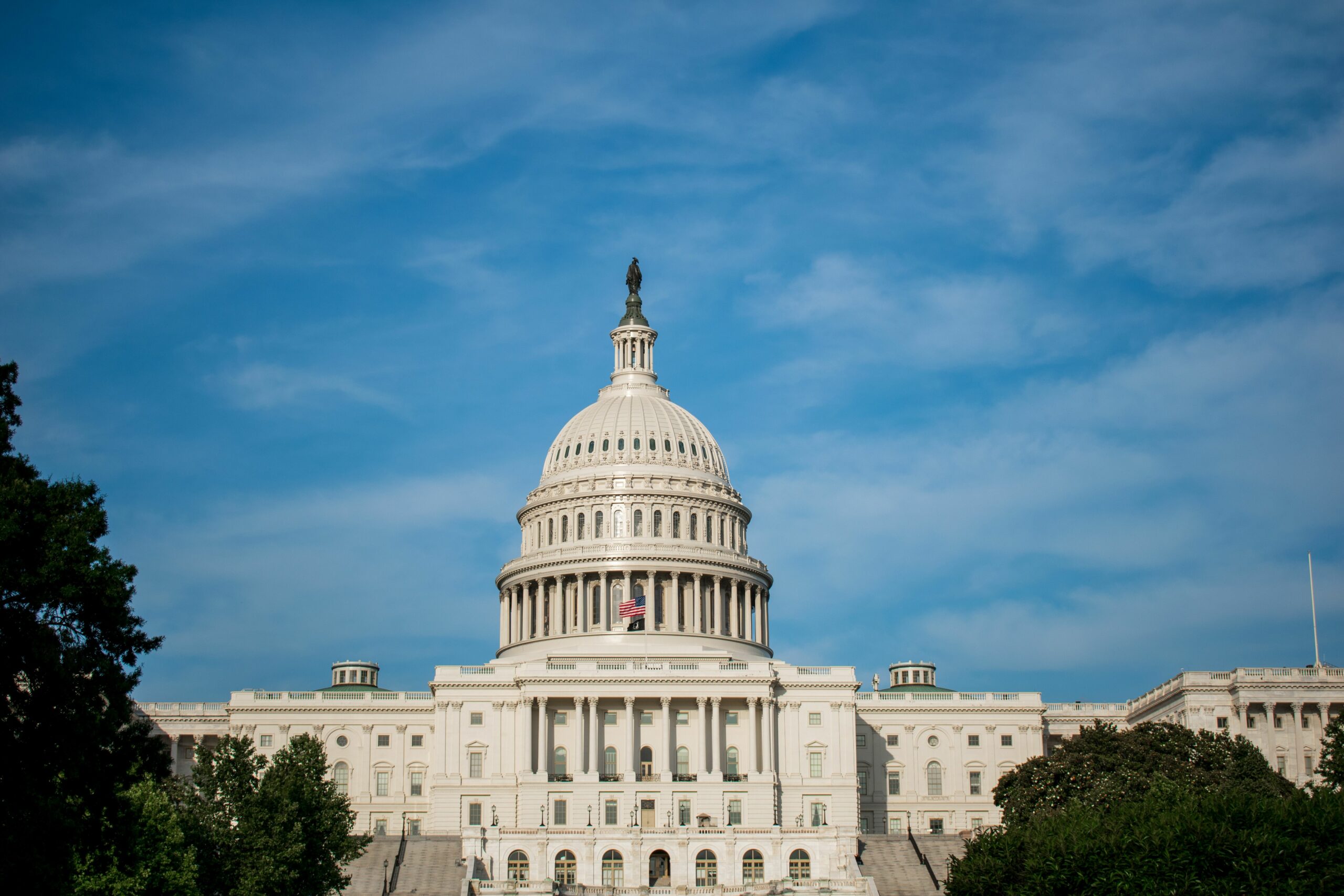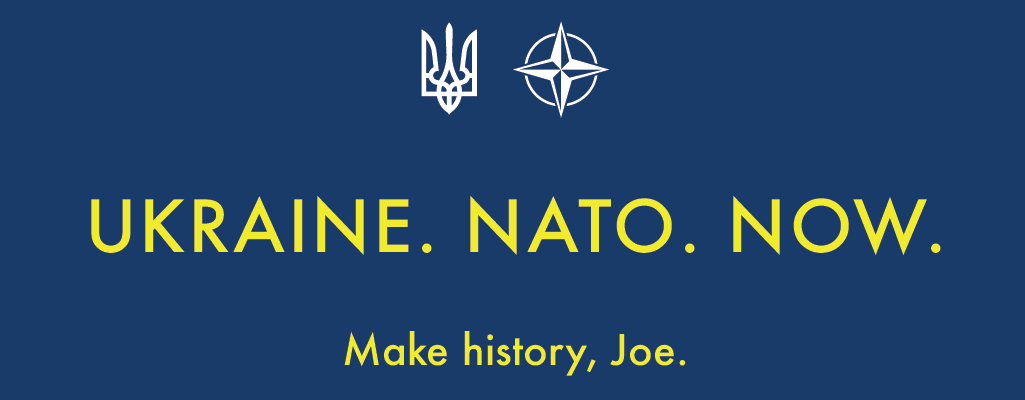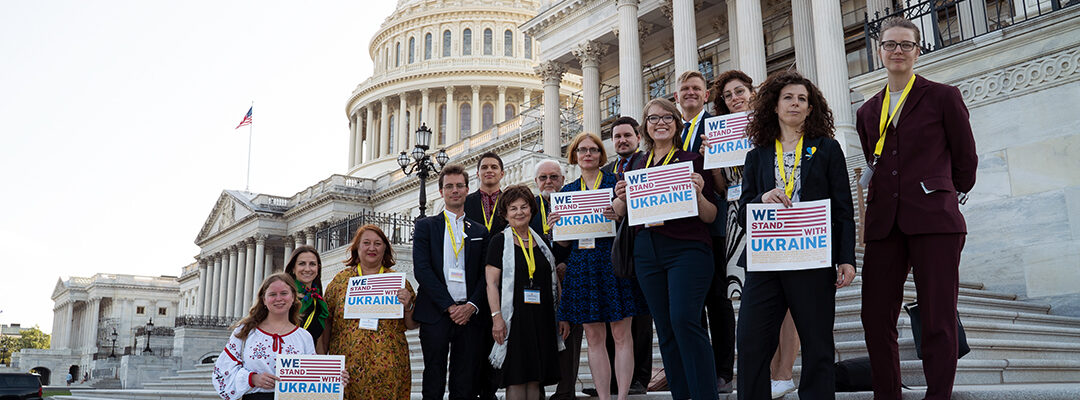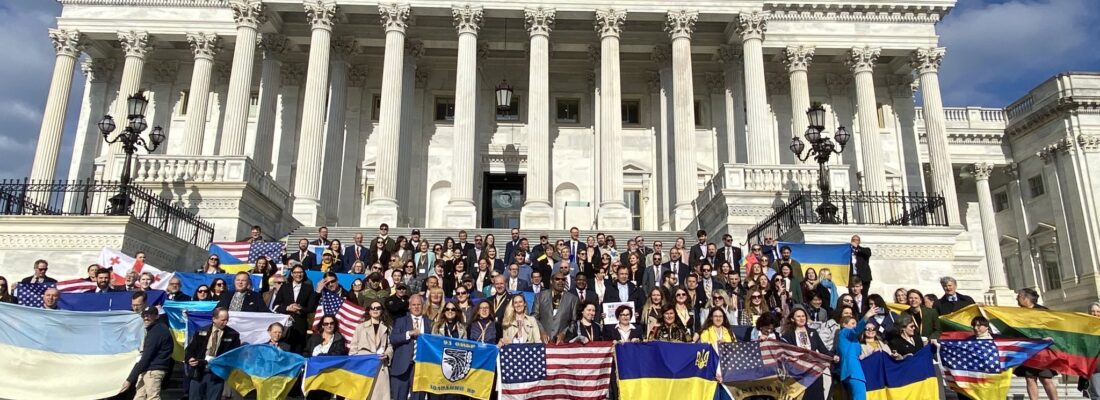Statement on NATO Summit and Proposed Amendment to Ban the Transfer of Cluster Munitions
#UkraineInNATO
On July 11-12, allies will meet in Vilnius, Lithuania for the NATO Summit and the status of Ukraine’s accession into NATO will be the top topic. We are asking the United States and our allies to support a clear roadmap of Ukraine into NATO – and invite you to join us for our #UkraineInNATO campaign.
– In 2008, NATO did not accept Ukraine and Georgia (Bucharest Summit Declaration). Since the Russian full-scale invasion, Finland has been accepted and Sweden applied for membership, resuming the conversation about including Ukraine.
– Many NATO members have expressed their willingness to accept Ukraine (Baltic states, UK, France, Poland) – the United States, which has not been clear about their support of an invitation for Ukraine, should join them. The decision about Ukrainian membership is contingent on the Biden Administration’s decision.
Read more:
- Ukraine Needs a Roadmap to NATO Membership ASAP – what exact steps NATO should take at the Summit next week.
- Why Ukraine should get an invitation to NATO – a breakdown addressing the main counterarguments to #UkraineInNATO

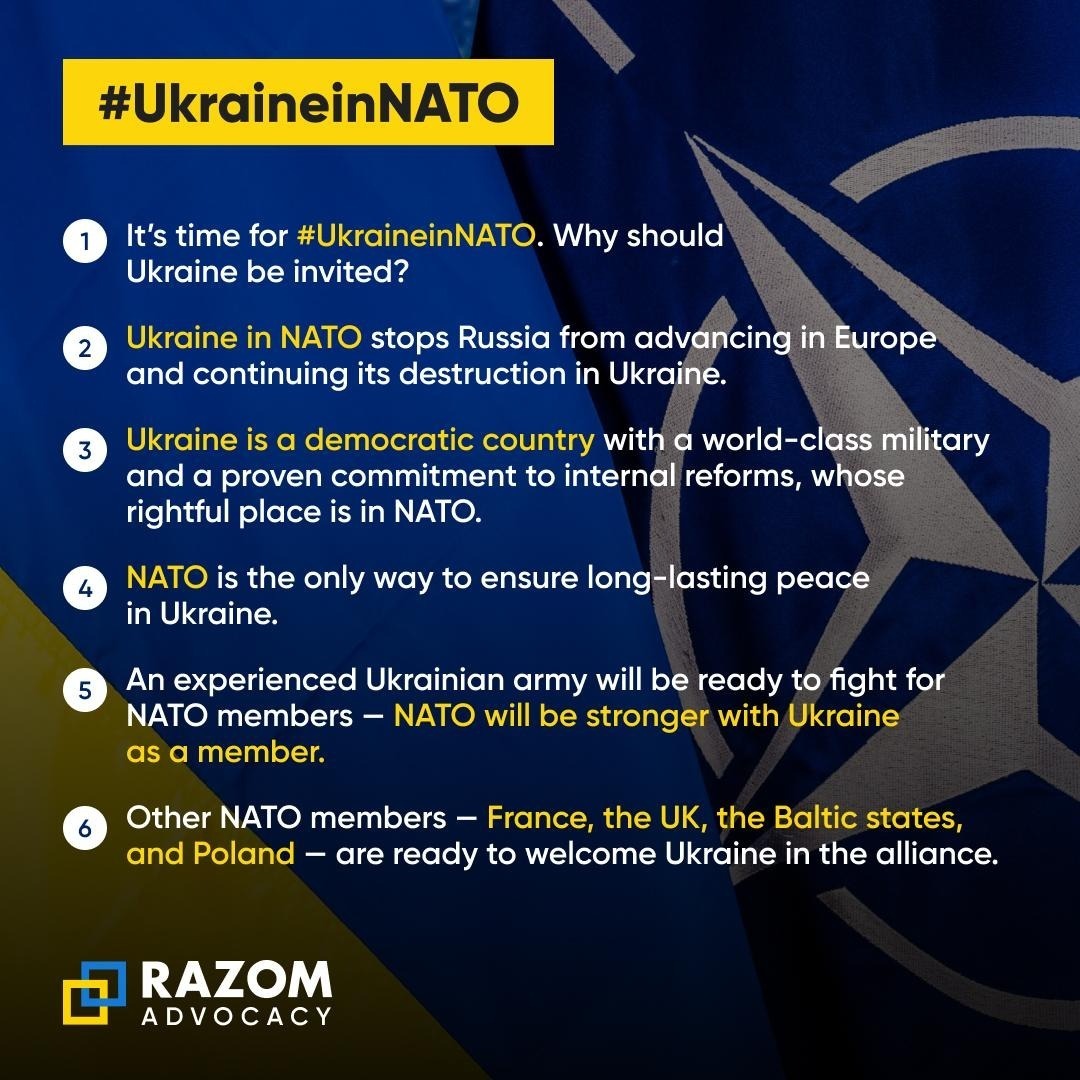
Join our campaign to broaden the support for Ukraine’s invitation into NATO by posting your message of support on social media with the hashtag #UkraineInNATO. Take your own photo – or use our graphics! Find an extended selection, free for download, here.

Need more ideas for content – or want to dig deeper into some of the reasons why NATO should admit Ukraine? Check out 7 Reasons Why Ukraine Should Receive NATO Invitation at Vilnius NATO Summit:
1. It’s cheaper to stop Russia in Ukraine than in Western Europe, and Ukraine’s eventual NATO membership is the only ironclad way to stop Russia in Ukraine.
2. Ukraine has proven that its rightful place is in NATO and is making great strides toward interoperability. It’s a democratic country making concrete efforts to curb corruption and conduct oversight with a world-class military, and an invitation to join would ensure the final steps for Ukraine meeting or exceeding NATO standards. Further reading: Just Security
3. NATO will be stronger with Ukraine as a member—Ukraine has the most experienced modern army in Europe. It has already shown it can be interoperable with NATO equipment, and NATO has much to learn from Ukraine’s 16 months of combat experience. Further reading: Newsweek, The New York Times
4. Best deterrent of future wars. Don’t repeat past mistakes—keeping Ukraine and Georgia out of NATO in 2008 allowed Russia to invade both. NATO membership is the best guarantee against future wars. Further reading: POLITICO
5. Don’t be late to the game! The consensus among NATO Allies is already building for Ukraine to join. France, the UK, the Baltic states, and Poland all are in favor of Ukrainian membership. Just like with weapons systems, consensus will only continue to build for membership for Ukraine.Further reading: Le Monde
6. NATO membership is the best way to bring stability to Ukraine and Europe. Ukraine needs weapons to win the war now, but the Alliance is what can bring lasting peace after Ukraine wins.Further reading: Washington Post
7. No more Bucharests. NATO already committed that Ukraine could join—now is the time to tell Ukraine when it can join. No one expects instant membership, but if Vilnius brings no specifics on when accession can happen, it will be Bucharest 2.0 and embolden the Russians. Further reading: Foreign Policy,Just Security
Keep up with the latest from Razom Advocacy by following us on Twitter @razomforukraine.
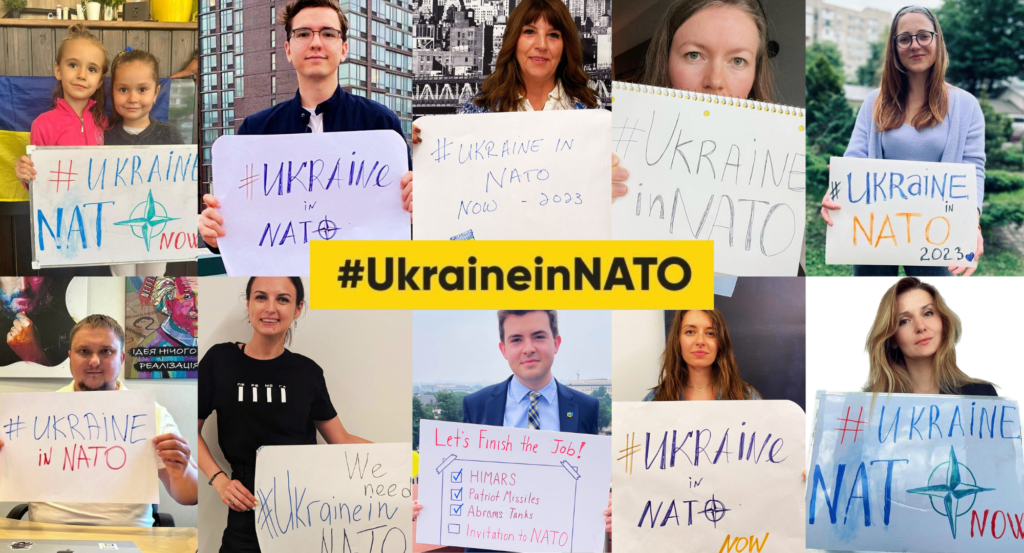
Razom Advocacy Key Messages and Target Legislation, Week of 6/22/23
As part of Razom Advocacy’s ongoing work advocating for policies that will help Ukraine achieve swift victory, we have created a weekly series of key messages/talking points and list of target legislation to help align nationwide advocacy efforts. Hover over the PDF to navigate to pages 2 & 3. Please feel free to download and distribute. Keep up with the latest on Razom’s advocacy work by following us on Twitter @razomforukraine.
Key-Messages-Week-of-6.22-1Razom Joins Statement about Congressional Ukraine Aid
Razom for Ukraine and Partners’ 2nd Annual Ukraine Action Summit Brings Together 300+ Advocates in Washington D.C.
WASHINGTON, D.C — This April, Razom for Ukraine, along with our partners in the American Coalition for Ukraine, co-organized the 2nd Ukraine Action Summit in Washington DC. This year, we expanded on all fronts – more participants, more partner organizations, and more programming. Over 300 participants from 34 states, representing 62 organizations, joined us in Washington D.C. for three days of Congressional meetings, advocacy training, panel discussions, and networking.

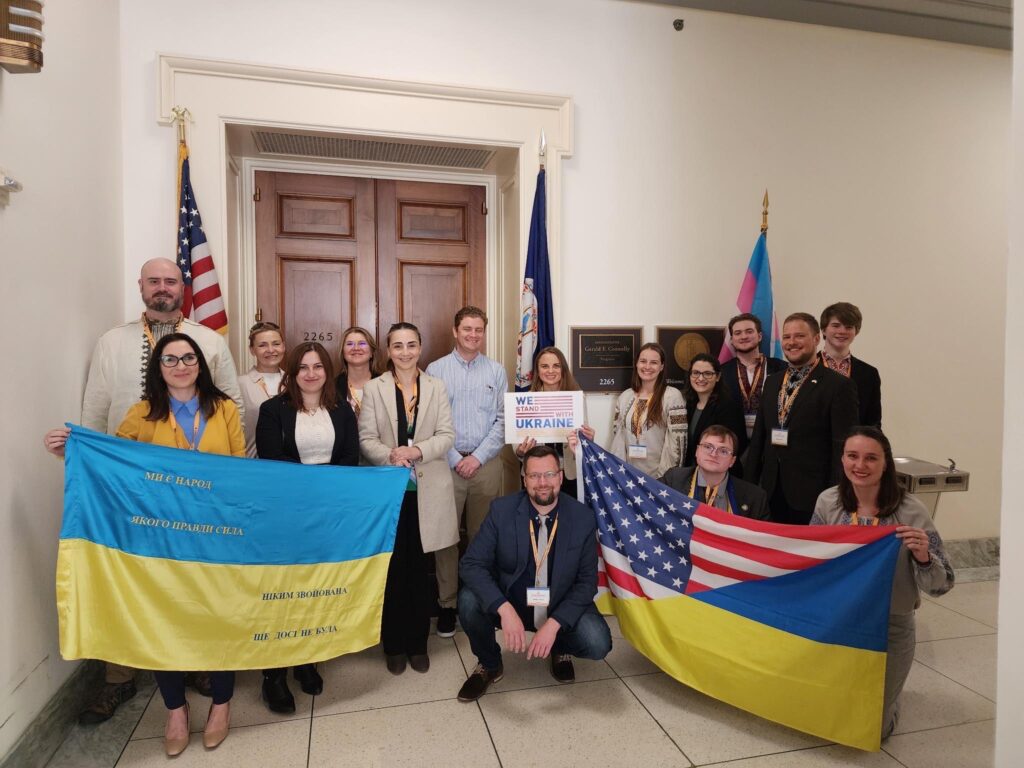
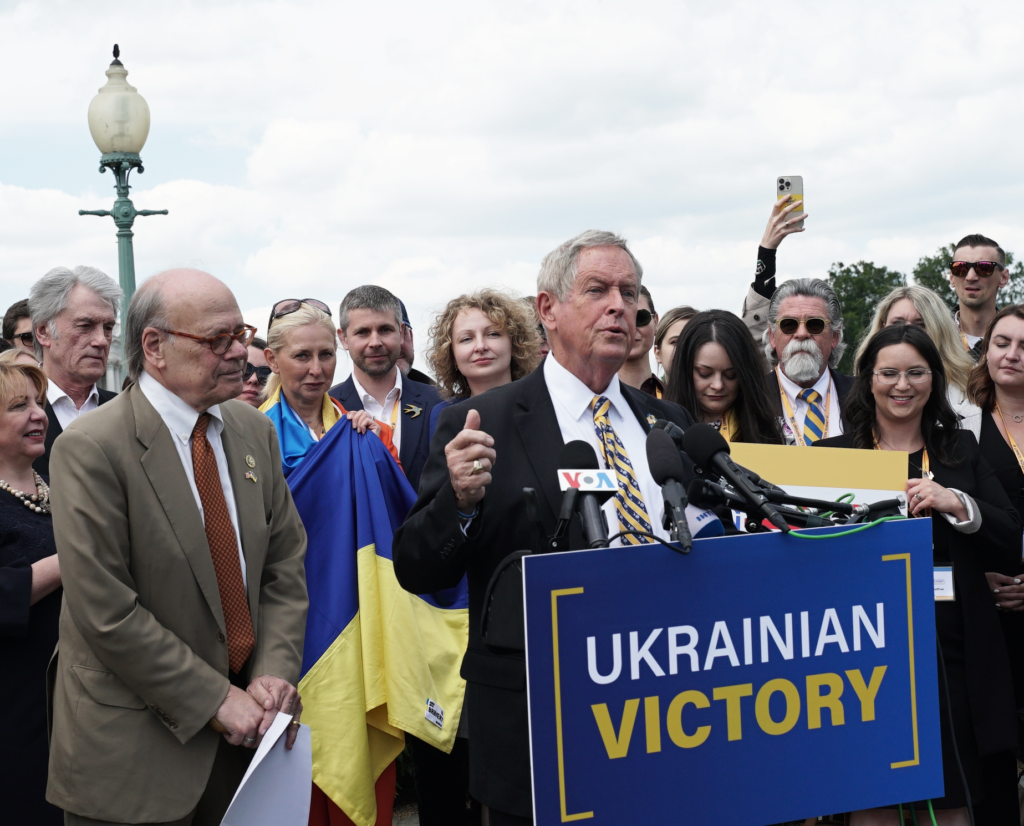
Our Summit began with a kickoff and advocacy training session at Georgetown University, where participants were given a primer on the key legislative issues around Ukraine, how to talk to lawmakers and staffers and met with their state delegations. For the next two days of the Summit, participants joined over 150 meetings with Congressional staffers, offices, and representatives from states across the country. All told, they met with 1/3rd of the offices in Congress.

During the meetings, participants discussed the measures Congress can take to help Ukraine, including designating the Wagner Group a foreign terrorist organization, declaring Ukraine’s invasion a genocide, providing consistent military aid, condemning Russia’s forced transfer of Ukrainian children, and more. We want to thank all the offices that welcomed our participants, and have supported Ukraine – victory will require us all working together.
Nearby, participants also attended panel sessions, held in downtown D.C, where they heard from experts on topics such as aid to Ukraine, the latest analysis from the frontlines, decolonizing Western academia, stopping genocide and child deportations, media and advocacy, and more. Experts presented candid insights and actionable tips for participants to maximize their advocacy work and educate their communities about Ukraine – thank you to all our panelists for joining us!

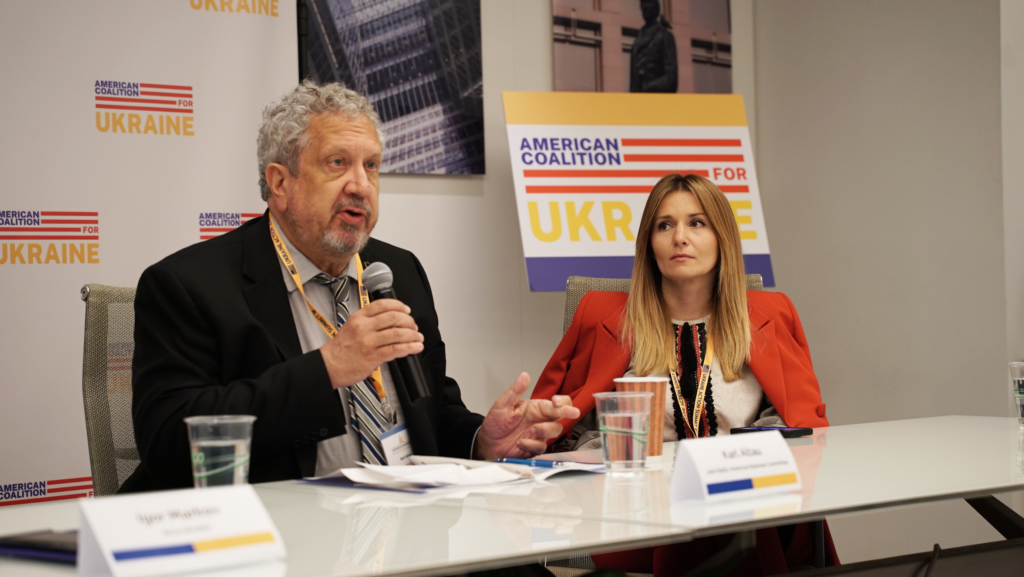
On Tuesday, participants joined a press conference on Capitol Grounds featuring Representatives Wilson, Cohen and Kaptur, alongside Ukrainian President Viktor Yushchenko. At the conference, the representatives announced the bipartisan Ukrainian Victory Resolution. The resolution affirms that it is the US policy to support Ukraine’s victory against the Russian invasion and holds that Ukraine must secure its victory by integration into NATO. It also declares that the United States must work with its allies and partners to ensure that Russian leaders are held accountable for their acts, while Ukraine receives reparations, reconstruction, and justice.

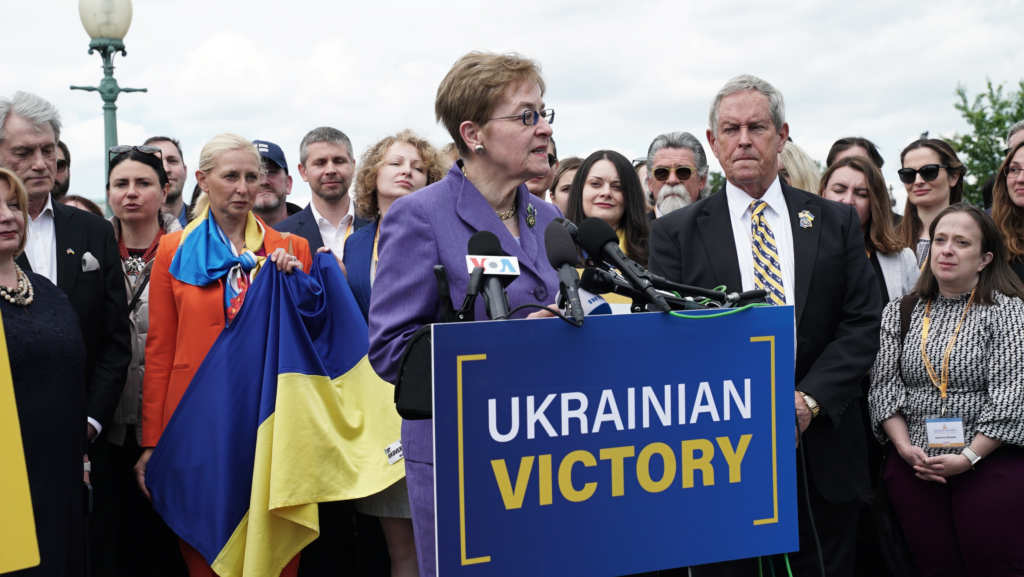
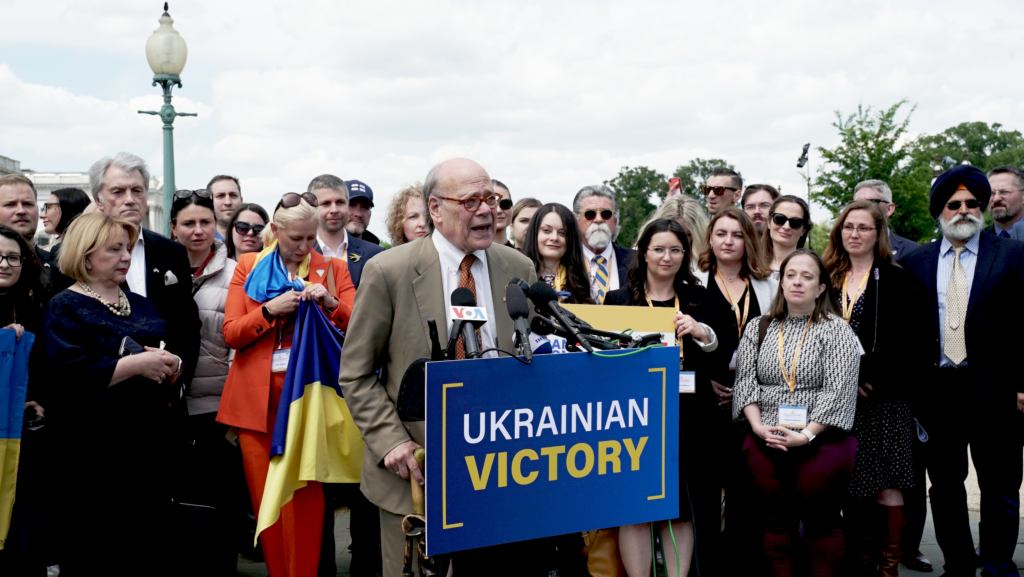
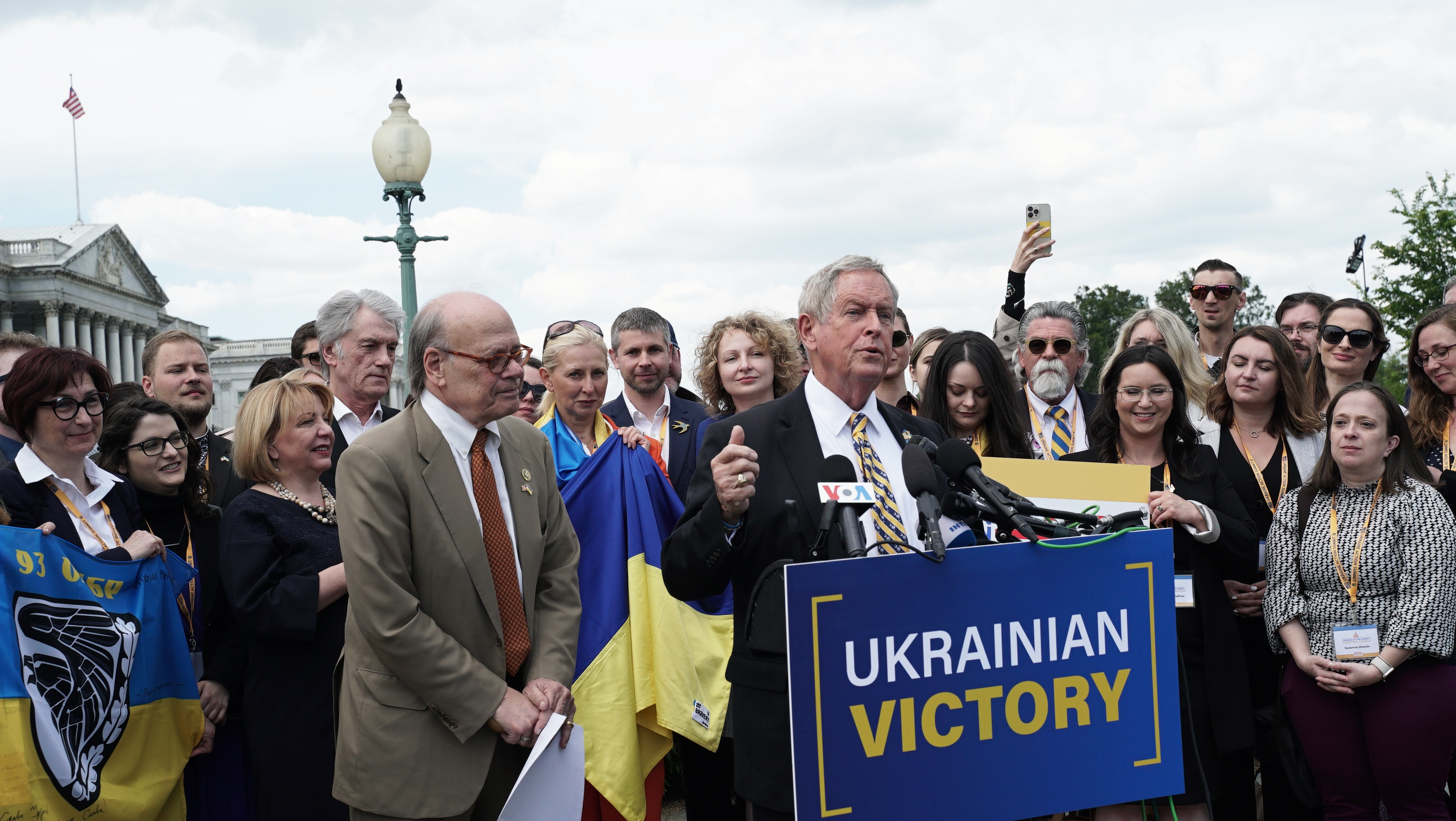
Thank you to these representatives and cosponsors of this important resolution, and the representatives who introduced it in the Senate: Senators Blumenthal, Whitehouse, and Graham. It is vital for our international partners that the United States have a clearly articulated strategy for supporting Ukraine – and this resolution lays out a vision for a secure, just peace for Ukraine.

The work of organizing the Summit was headed up by Razom Advocacy – a branch of Razom for Ukraine committed to advancing nonpartisan research and policy and to nurturing community engagement across the United States and Ukraine – in collaboration with the American Coalition for Ukraine. To learn more about the Ukraine Action Summit and the American Coalition for Ukraine, visit AmericanCoalitionForUkraine.org, & check out the hashtags #UkraineActionSummit on social media.

Being able to bring together so many advocates from around the country to fight for peace, justice, and prosperity in Ukraine, for the second time in less than a year, has been stupendous. Showing unity and enthusiasm is crucial for sustaining strong support for Ukraine by our representatives. We look forward to continuing this important work together. To be the first to know about the dates for the next Summit, follow the American Coalition for Ukraine on Facebook.
Joint Statement on Recent Comments by Governor DeSantis
Don’t Believe the Hype — Bipartisan Support for Ukraine Remains Strong in Congress
By Government Affairs Team, Razom Advocacy
As the new Republican majority in the House of Representatives gets underway for the 118th Congress, a narrative has taken hold that there is a growing partisan divide when it comes to supporting Ukraine. According to this misguided idea, Republicans across the board are raising new roadblocks and have turned against Ukraine, while Democrats want to see Ukraine prevail against the genocidal war currently being waged by Russia.
This narrative is demonstrably incorrect and diminishes a genuine area of bipartisan cooperation in Washington.
While some members of both parties have cast doubt on US policy towards Ukraine, they remain in the small minorities on both sides of the aisle. Certain Members of Congress from each major party have been vocal about their objections to further US support for Ukraine, but they have been far more effective in attracting headlines than the support of their fellow lawmakers.
Over the course of the 117th Congress, our tracking index of 23 key Russia- and Ukraine-related votes in the House of Representatives reveals an overwhelmingly pro-Ukraine voting record for both parties. From legislation to sanction Russia economic actors, to support the victims of Putin’s aggression, and to send aid to Ukraine, the record paints a clear picture. The Republican caucus consistently voted in favor of Ukraine, vastly outvoting the less than 10 percent of House Republicans who regularly voted against these measures.
The bipartisan record of support for Ukraine is even stronger in the Senate. Take, for example, the recent inclusion of $45 billion dollars for Ukraine in December’s Omnibus spending package. The final level of support was $7 billion or 15 percent above what was requested by the Biden Administration. Those additional funds were championed by leaders of both parties and would not have happened if it were not for the specific work of Senate Minority Leader Mitch McConnell and Senator James Risch — both Republicans.
Leaders of the Republican party talk the talk as well as walking the walk. In his speech at the Munich Security Conference on February 17, Leader McConnell underscored his party’s commitment: “My party’s leaders overwhelmingly support a strong, involved America and a robust trans-Atlantic alliance. Don’t look at Twitter, look at people in power… We are committed to helping Ukraine.” And in his appearance on Fox News on February 16th, he made the case directly to the American people: “I’m going to try to help explain to the American people that defeating the Russians in Ukraine is the single most important event going on in the world right now.”

Indeed, just in the week of February 13th, two major pro-Ukraine bills have been reintroduced with strong bipartisan support, the Holding Accountable Russian Mercenaries (HARM) Act and the Ukraine Genocide Resolution. These bills are important ways for Congress to aid Ukraine in its fight, by enacting more punitive designations for Russian armed groups and calling out the actions of the aggressors as the genocide they are.
Without a doubt, there is much work to be done in the weeks and months ahead to maintain and expand the bipartisan support for Ukraine in the 118th Congress — especially as new fights on raising the debt ceiling loom large. Yet careful observers should be wary of easy or simplistic narratives that view everything in Washington through a purely partisan lens.
Members on both sides of the aisle — Republican and Democrat — are deeply and demonstrably committed to Ukraine’s victory. While members may differ on specific tactics or details of policy, the genuine support for Ukraine is palpable.
Lone or fringe voices can be loud, but not necessarily convincing. American leaders of both political parties are undertaking great efforts to see that Ukraine is ultimately victorious. And when victory does come, Ukraine will rightly be able to thank Republicans, Democrats, and Independants for the support America provided.
One Year of Full-Scale Invasion
The ongoing conflict in Ukraine has had a profound impact on the lives of countless individuals and communities. The Razom Advocacy team recaps the past year of the full-scale invasion in Ukraine and provides a comprehensive overview of the events and developments that have taken place over the past year, including the impact of the conflict on human lives, infrastructure, and the broader geopolitical landscape.
One-Year-of-Full-Scale-InvasionBy Razom Advocacy Team
War in Ukraine and Food Security
Food security is a vital aspect of national security, and in recent years, Ukraine, with its fertile black soil, has become a significant player in the global agricultural market and established itself as the breadbasket of Europe. However, Russia’s invasion plagued Ukraine with war, and the ongoing conflict has disrupted the country’s agricultural industry and affected its ability to export its produce. In what follows, we aim to explore the relationship between food security and war in Ukraine and to understand the impact of the ongoing conflict on the country’s ability to feed its people and contribute to global food security.
War-in-Ukraine-and-Food-Security Food-security_grain-initiatives-By Maryna Maiboroda & Luba Krylova
